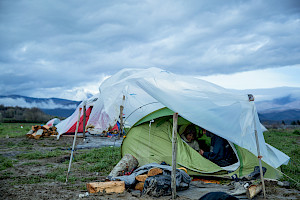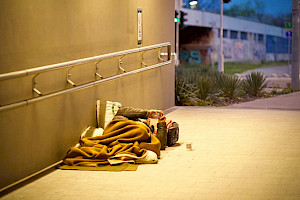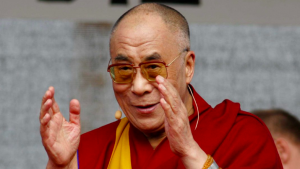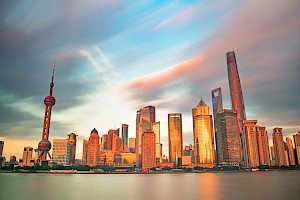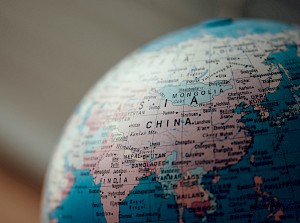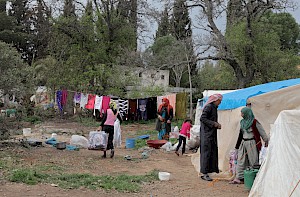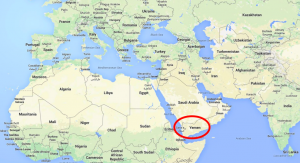Selective empathy: An observation on classes of refugees
April 04, 2022Originally published in Philanthropy News Digest on March 25, 2022
“These are people who are Europeans, so we and all other countries are ready to welcome them. In other words, this is not the refugee wave that we are used to, where we don’t know what to do, people with an uncertain past—are they terrorists?”
These are the words spoken by Bulgaria’s prime minister, Kiril Petkov, in reference to the millions of Ukrainians who have crossed into neighboring countries since the Russian invasion began on February 24. This sentiment, whether spoken aloud or not, is prevalent among many European politicians. It helps explain the stark contrast between the approach being taken with Ukrainians and that afforded to other refugees, such as those fleeing terrible situations in Syria, Afghanistan, and across Africa. European leaders are bending over backwards to welcome Ukrainian refugees. Meanwhile, people of African descent and other racial/ethnic minorities have faced discriminatory treatment as they flee Ukraine.
Fearing those who don’t “look like us” or who worship God in a different manner is neither new not unique to Europeans. Hungary’s populist leader, Viktor Orbán, labeling all refugees from the Middle East “economic migrants” in contrast to the “proper” Ukrainian refugees is not that dissimilar to Donald Trump calling Mexicans “murderers and rapists.”
To be clear: I am all for helping Ukrainians in this time of need, and I am supporting two humanitarian organizations on the ground there: CORE and World Central Kitchen. That said, I feel compelled to point out the inconsistency in how the international community treats refugees depending on their race, color, and religion.
To their credit, Germany and Sweden also did their fair share of absorbing the wave of Syrian refugees, but not without backlash from their own constituents. The rest of Europe was less welcoming and certain European countries were downright hostile. In Greece, for instance, where I spent time and resources assisting Syrians during the height of the 2015 refugee crisis, I watched as the initial welcome mat was quickly pulled away and replaced by harassment, including criminalizing individuals and NGOs who were assisting refugees. We tend to forget that, of the seven million Syrian refugees, 90 percent flowed into neighboring Turkey as well as Jordan and Lebanon, both of which were poorly equipped to absorb those numbers. The cultures in these countries are very similar to Syria, which made it easier for refugees to integrate.
It was only when these countries reached their capacity that large numbers of Syrians started to make their way to Europe. It should be noted that the rich Gulf countries, also geographically close and with similar cultures, took in an embarrassingly small number of Syrians.
Canada was heralded as a beacon of civility when it took in 70,000 Syrians over a four-year period through a combination of traditional resettlement and sponsorship. I am proud to be one of the founding partners (along with the Government of Canada, UNHCR , the Open Society Foundations, and the University of Ottawa) of the Global Refugee Sponsorship Initiative (GRSI), which is successfully exporting Canada’s proven model of individual and community refugee sponsorship to countries around the world.
But even Canada is giving Ukrainian refugees a warmer welcome than it has refugees from other places. The federal government recently announced a program that will allow an unlimited number of Ukrainian refugees to come to the country. Nine thousand Ukrainians have entered Canada over the past two months, and Canada already hosts the world’s third largest Ukrainian population of 1.3 million. This makes integration easier, but it is also easy to lose sight of the other global populations that need our support as well.
The situation in the United States is starkly different. Although President Joe Biden offered to welcome Ukrainians fleeing war “with open arms” in a March 11 speech it wasn’t until March 24, when he was in Brussels to meet with NATO and G7 leaders, that he announced that the U.S. would accept 100,000 Ukrainian refugees and commit $1 billion to help European countries deal with the surge. I believe the current administration’s intentions are good, but under Trump the sentiment was one of distain toward certain nationalities—referred to as those coming from “shithole” countries—and the system has been slow to respond to the change in attitude. The red tape is such that thus far, only 690 Ukrainians have managed to enter the U.S. since October. The Biden administration just announced sweeping changes to its asylum application process, however, so perhaps we will see an improvement.
It seems our civilization is not as evolved as we like to think. We are still tribal when it comes to mixing with cultures that are dissimilar and we’re more welcoming to those who are familiar. I have witnessed the difference in attitudes personally with my own work with refugees. For instance, while conducting our Acceso feeding program on the Colombian border, I saw how welcoming Colombians have been toward 1.7 million Venezuelans escaping the civil unrest—very different from what I witnessed with the Greek attitude toward Syrians as the crisis deepened.
There are 84 million displaced people in the world, many with little prospect of ever returning to their homes. We need to find permanent resettlement solutions to alleviate this tragedy. Organizations such as GRSI are working to change our collective attitudes toward people who are unfamiliar to us—which can begin with welcoming the new kid next door.
GRSI can provide one small step toward solving this gargantuan problem. But a solution will require all of us, NGOs , philanthropists, celebrities, and other influencers to educate ourselves as to the never-ending reality global refugees face. We need to look beyond the tragedies that make headlines at a given moment in time. Refugees of every race and religion share a common fate: the loss of their homes, their communities, their hopes and dreams.
As a Syrian refugee I once met in Izmir, Turkey, said when I told him we were there to help people like him: “Of course. After all, we are all brothers.”


